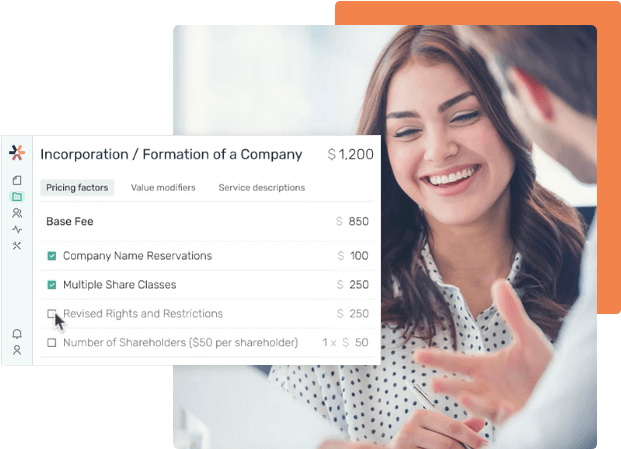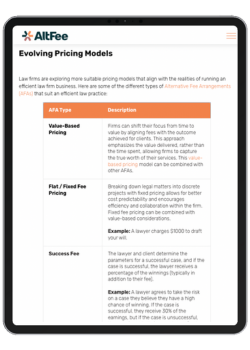- Resources
- Ultimate Guide to Billing Software Law Firm Employees Can Benefit From
Table of Contents
According to Thompson Reuters, legal e-billing can make up anywhere from 30-80% of invoices sent out. And, moving into the future, this will likely only increase.
Law firm billing software makes it easier to manage billing processes, invoicing, and other aspects of the legal billing cycle. With billing software, law firm employees and executives alike can have an easier time collecting payments while at the same time ensuring that billing is transparent.
This guide goes more in-depth on billing software law firm employees can make use of, how it works, and why it’s so important. Plus, it explains a few of the best billing software options for lawyers out there.
What is Attorney Billing Software?
Attorney or legal billing software is technology that enables legal firms and professionals to build and send out invoices to clients and even allow clients to pay their bills online.
In the context of alternative fee arrangements, attorney billing software translates pre-determined pricing arrangements into invoices that can be sent to the client. By creating and using billing templates and integrating with cloud-based legal practice management software for law firms, the typically tedious process of creating an invoice can be lessened by using existing templates as a base and taking advantage of features like autofill to fill in client information automatically.
For instance, billing software, such as Clio Manage, can integrate with pricing software such as AltFee. This makes it easier to ensure that client information always stays accurate. In the context of AltFee, changes to client information that are made in Clio automatically update in AltFee. This ensures that both systems have the most up-to-date and accurate client information and eliminates potential errors that could occur with manual entry.
Why Should Law Firms Use Law Billing Software?
From increased billing efficiency to ease of client payment, there are a myriad of reasons why law firms should invest in law billing software.
A few of the top reasons why law firms use billing software include:
- Makes internal data retrieval easier (e.g., trust accounting compliance)
- Easier to handle billing for multiple clients
- Better accessibility with online options available for clients to pay their bills
However, there’s a lot more to understand about these benefits than just that they exist. Let’s get into more about the range of benefits below.
Instant Data Retrieval
Before billing software was available, paperwork filing was the norm. While the system was productive for the time, the potential for misplaced documents and incorrect billing information was much higher.
Legal billing software keeps track of all data related to billing through electronic records. Because everything is electronic, you also have the power to type in the specific record you want to search for. This not only saves a lot of time because accessing your desired information is now faster and more efficient, but it also makes financial audits much easier.
For example, trust accounting rules in Canada and the United States typically require law firms to have separate trust accounts so client funds do not mix with the law firm’s regular funds. Having law billing software combined with effective legal accounting makes the process of accessing and presenting proof that client trust payments are slated to go into separate accounts easier than rifling through paper files.
Easy Handling of Multiple Clients
When you have multiple clients, using legal billing software is a more effective solution for keeping track of financials over pen and paper or spreadsheets. Invoice and billing information is stored and easily searchable if needed at a later time.
Easily Accessible
One of the most significant advantages of legal technology is automation and faster access. Because billing software is typically available online, you can get ahold of the information and data you need anytime from anywhere.
A few ways that law firm billing software is accessible include:
- Easy for remote teams to connect to and access
- Available on mobile platforms
- Digitally accessible to clients
All these features improve the accessibility of the billing process, both to the client and the legal team.
High Level of Security
Most legal billing software is encrypted with sophisticated and high-level password protection. For example, they may have multi-factor authentication in place to ensure that no unwanted third parties access the systems. This ensures that your client’s data and personal financial details are secured and kept safe.
In addition, legal billing software often creates digital backups of your invoices and information. This helps ensure that legal teams have access to older records and invoices so that they can run audits or provide details in the event of an audit.
Challenges That Can Be Solved by Legal Billing Software
Legal billing software has proven its effectiveness in helping law professionals achieve productivity and efficiency. As an automated and innovative solution, it can help your firm overcome billing and invoicing challenges.
A few key challenges are outlined in the table below.
|
Challenge |
How Billing Software Helps |
|
Inefficient Collections |
Legal e-billing software can create digital, templated invoices that are faster to modify and prepare for clients. Then, these can be sent out electronically so that clients receive them in a matter of minutes as opposed to the days or weeks it could take to send them through the traditional postal system. |
|
Human Error |
Manually created invoices can undoubtedly have a level of human error. With billing software, the program picks up on any financial discrepancies or spelling mistakes that can delay the billing cycle or cause unnecessary back and forth. |
|
Poor Client Experience |
Using paper invoices lengthens the billing process and makes it more difficult for clients to pay their bill, as they have to visit the firm in person or mail a check. Legal e-billing software allows online payments, making it easier for clients to pay their bill on time. The 2021 Legal Trends Report by Clio indicates that firms that offer payment plans (which includes the ability to make online payments) is a significant factor (51%) in the client’s decision as to whether to go with that firm or not. |
|
Poor Record Keeping and Analysis |
Paper invoicing can lead to disorganization and poor record keeping. Not only is this bad for compliance and financial audits, but it can also make it tough to perform financial analyses on ROI. This can cause a loss of profit in the long run and lead to poor financial management of the firm. |
These are just a few of the challenges that legal firms can face. Let’s take a closer look into billing software for lawyers and how it can help legal teams overcome challenges.
Inconsistent Cashflow and Slow Payment Processes
The 2022 Legal Trends Report by Clio revealed that most lawyers are not able to collect at least 12% of billable hours. This is one of the many reasons lawyers are turning to systems like alternative fee arrangements to collect more for their hard work.
However, even with AFAs in place, it can take time to collect on invoices from clients using manual processes. Legal teams need to prepare the invoice, print it, and send it out through the post. Together, these processes can take weeks. Additionally, inconsistencies with when invoices are sent out can delay payments further, affecting the accuracy of financial reports and contributing to inconsistent cash flow for the law firm.
Worse yet, manual billing processes can lead to human error that can cause back and forth between the attorney and client. This can slow down the legal billing process even more, making it even harder for lawyers to get paid.
On the other hand, with legal billing software, lawyers can reduce payment processing time through template creation that reduces human error and create invoices in a matter of minutes. From there, they can use e-delivery to send out bills and receive payments virtually instead of waiting for paper payments to come through. Automatic notifications can be set up that send reminders to the client and the lawyer in the event that the stated period for receiving the payment (typically 14 to 30 days) has lapsed, taking the burden off of the lawyer or administrative team to remind the client that their payment is due.
Lack of Data-Driven Financial Decisions
Whatever decisions you make for your legal firm, always remember that data is crucial. If financial decisions are made based on gut feelings rather than paying attention to what the data from your legal technology is telling you, then you may be missing out on potential savings and operational optimizations.
Legal billing software lets you make data-driven decisions through the following:
- Capturing billing data
- Creating regular legal billing reports
- Tracking legal billing analytics
These metrics will allow you to create changes according to key performance indicators. A few of those KPIs include:
- Collection rates
- Realization rates
- Turnaround time for bill payments
- Annual returns
Legal billing software makes it easier to get an accurate picture of these data points so that legal teams can maximize collections and ensure that they’re earning a profit on their work.
Archaic Client Experience
Regardless of the size of your legal firm, you should always prioritize your clients. They should always have the best experience so your firm will continuously receive positive feedback and client recommendations.
This is where legal billing software allows your firm to have an edge over your competitors. The software lets you have clarity and transparency with your clients, potentially increasing their trust.
Moreover, legal billing software can help you create consistent bills to prevent miscommunication with your clients. Bills are easier to understand, meaning clients will spend less time needing to interpret what’s written.
Further to this, billing software makes it easier to use standard billing codes like LEDES and other coding systems. In turn, this helps provide clear, consistent bills every time with billing software making it easier to accommodate corporate clients or other types of clients that have specific requirements for invoice formatting since a template can be created in advance. Repeat clients will begin to recognize your firm’s standardized billing format and appreciate the consistency, which increases trust.
What’s more, law firm billing software with online payment capabilities makes it easier for clients to pay their bills. This, in turn, boosts a firm’s collection rate and improves the bottom line of the business.
All of those features lead to a better client experience overall and less back and forth with the client.
Billing for Alternative Fee Arrangements
Billing software also makes it easier to manage alternative fee arrangements for progressive teams that are moving away from the billable hour. One such method would be through using AltFee in conjunction with Clio.
This partnership makes it easy for firms to manage specific pricing systems for each AFA for each client through AltFee. Then, it enables easy invoice management by ensuring client data is consistent between platforms before sending out the invoice.
Start Earning More Revenue with Fixed Fees
Break free from hourly pricing and take the fear out of scoping and pricing client projects to start maximizing profitability.
Book A Demo
Must-Have Features for Time and Billing Software for Law Firms
Choosing an ideal time and billing software that is right for your firm requires consideration of how it will fit into your current legal tech stack. For instance, it’s compatibility with your current legal practice management software, as well as any other tools you use.
Let’s look at five of the must-have features you must consider when looking at your billing software options.
|
Must-Have Feature |
Benefit |
|
Convenient online payments |
Various payment integrations that can accept different payment methods (e.g., PayPal, credit card, Interac) |
|
Detailed report functionality |
Provide insights about the financial aspects of your law firm |
|
Time tracking functionality |
Allows for ease and consistency of time tracking |
|
A secure client portal that makes it easy and transparent for clients to access information and handle payments |
Reduces misunderstanding and mishaps with clients |
|
The ability to accept standardized billing codes (e.g. LEDES, either by itself or paired with UTBMS) |
Allows consistent invoices to be created with standardized billing descriptions for certain tasks |
|
Flexible API for integration with other software, such as pricing software |
APIs allow billing software for law firms to be integrated with the firm’s other software, facilitating seamless information transfer and contributing to a consistent, efficient billing process |
Traditional vs Cloud-Based Invoice Management for Legal Firms
There’s a big difference between traditional and cloud-based invoice management for legal firms.
Traditionally, when lawyers needed to send an invoice to a client, they had to sit down and manually create the invoice using pen and paper or Microsoft Excel. This could lead to human error, inconsistent formatting, and disorganization.
On top of that, lawyers then had to send out the invoices in the mail and wait for the client to mail back their payment. The entire process could be time-consuming, disorganized, and lengthy.
In contrast, cloud-based invoice management digitizes all these processes. Firms can use templates to quickly create standardized invoices with reduced human error that only need to be minorly adjusted before they’re ready to send out.
From there, firms can send out the invoices digitally, allowing instant delivery and payment of bills. The result is faster collection of payments, leading to better realization rates.
Benefits of Legal Invoice Software
Legal invoice software promotes the accuracy, productivity, and efficiency of the billing cycle. The following are the key benefits your firm can enjoy when using this technology.
Improving Precision in Billing to Save Time and Money
It all boils down to the power of automation. Because legal invoice software ensures everything is automated, your firm’s workflows are optimized, which helps with improving your organization’s overall productivity.
Automated tasks with this software include:
- Time tracking
- Bill monitoring and invoice generation
- Invoice delivery
Because these tasks are automated, you’re allowing your firm to save more time compared to manually carrying out these tasks. Moreover, you can use the saved time to accomplish other valuable tasks for your business goals. Also, automation means you can expect fewer mistakes to be committed.
Integrated Reminders and Notifications
Legal billing software also makes sure that legal teams never forget when it’s time to bill a client. Many systems have notifications that will remind lawyers when to send invoices and when to follow up with clients on unpaid invoices.
A lot of systems can also be integrated with Outlook, Google, or other calendars. This can help lawyers plan their work week and set aside sufficient time for phone calls and invoicing.
The result can be smoother invoicing and higher collection rates, both of which benefit the firm.
User-Friendly Interface
Cloud-based legal billing software is typically easy to use and doesn’t involve a lot of training. This makes it handy for legal teams to switch from manual billing methods and to implement new digital processes.
As a result, teams can actually save time on billing processes through simple, easy-to-use platforms that make it easy to create, send, and organize invoices.
Best Time and Billing Software for Attorneys
Now that you finally have an overview of the importance and benefits of legal billing software, it’s time to choose one for your legal firm. Knowing what you require largely depends on the overall size of your company.
Larger law firms need software that’s more extensive and can support large-scale operations. At the same time, small law firms need systems that are simple to use but can be easily scaled. Here are a few top recommendations for each type of law firm.
Billing Software for Small Law Firms
Besides having a CRM for small firms, your team also needs to have billing systems in place that are easy to navigate and use.
Small legal firms generally have fewer employees, so in theory, it should be easier for a small team to get up to speed on how your chosen software works.
Although there are many different billing software that small legal teams can use, a few of the best include:
- Smokeball
- MyCase
- TimeSolv
Let’s take a closer look at each of these.
Smokeball
One of the easiest software to use for small legal firms is Smokeball. This cloud-based legal billing and practice management software allows your firm to easily track hours worked on a project. Moreover, it features more than 20,000 ready-to-use and downloadable forms together with Microsoft Office integration.
What makes Smokeball unique is its robust mobile app, making it convenient to use anytime and anywhere. Smokeball’s billing processes also allow your firm to gain insights into how your team is spending their time. Not only can this help your firm improve and become more productive and profitable, but it can also help your team create fair and accurate AFAs for clients.
MyCase
Another legal billing software system with a user-friendly interface is MyCase. It mainly targets small to mid-market firms, and it features high-quality security measures to keep your clients’ data protected.
Users loved the software’s efficiency in billing clients and generating accurate invoices, which lessened possible miscommunication with clients. Moreover, because it’s cloud-based, it’s easy to access the data you need whenever and wherever.
MyCase has also been proven to improve productivity, especially in task management. More than being legal billing software, other legal firms loved that it features a client-based experience.
TimeSolv
TimeSolv is one of the oldest legal billing software in the market. It’s fast, convenient, and ideal for small to mid-sized legal firms. With its own mobile app, legal professionals can access the information they need anytime and anywhere.
Moreover, users love TimeSolv because they can use it both online and offline. This lessens the pressure of having to search for a stable internet connection when you need to access certain files.
Legal Billing Software for Large Firms
Larger legal firms will likely require a more robust system where employees can simultaneously work to speed up operations and transaction processes. Although there are many legal billing software systems out there, some stand out more than others.
The following have been proven to stand the test of time in working with large legal firms.
Clio
Clio is hands-down a favorite among law firms. More than its efficient payment system, Clio also features a stable project management system to keep your tasks and documents organized and in place.
Moreover, Clio offers flexibility in almost all aspects. It integrates with AltFee, helping users improve their alternative fee arrangement pricing system. Payments are also guaranteed to be secure and safe, so you don’t need to worry about your credit card details being stolen by hackers.
Clio also features its built-in time-tracking system, making it easier for firms to record and track hours worked for generating precise invoices.
Rocket Matter
Primarily for case management and legal billing, Rocket Matter is another cloud-based software ideal for large legal firms. It allows professionals to store data in a single place, which includes tasks, documents, hours worked for the sake of creating AFAs, and emails.
Rocket Matter features Kanban boards which are perfect for document organization and storage. Sharing documents with your clients is also made secure. Moreover, templates are available for download, which you may apply to your case management.
Billing is automated for this billing software, so you can easily send out invoices after being checked and reviewed by the billing attorney. This also gives you more time to accomplish other tasks.
Conclusion
Legal billing software solves all your issues and challenges with tracking work done on matters, generating invoices, and asking for clients’ payments. Accounting matters are less challenging and easier to deal with when you utilize this software for your firm.
Legal billing software allows instant data retrieval, easy accessibility, simultaneous data handling, and high-level security – features you won’t find with on-site and traditional billing processes. And when choosing the right one for your firm, consider your firm’s size, budget, and the exact features you need to make things easier for your staff.
One software that integrates with one of the top legal billing software, Clio, is AltFee. AltFee is a pricing system that helps your team create straightforward and transparent fees for clients. Book a demo today to learn more about how AltFee works and why it’s so beneficial to your firm.
Start Earning More Revenue with Fixed Fees
Break free from hourly pricing and take the fear out of scoping and pricing client projects to start maximizing profitability.
Book A Demo



Newsletter Signup
Subscribe to our newsletter to receive the latest news.






